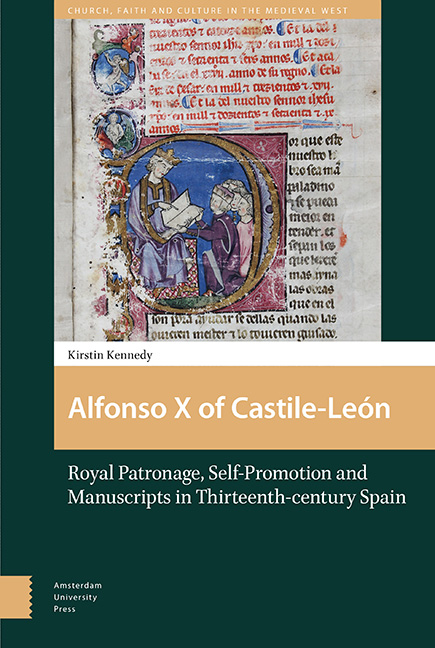 Alfonso X of Castile-León
Alfonso X of Castile-León Book contents
- Frontmatter
- Dedication
- Contents
- Acknowledgements
- List of Figures
- Abbreviations
- Introduction: ‘the king Makes a Book’
- 1 Alfonso X, his Literary Patronage, and the Verdict of Historians
- 2 Alfonso in his Texts: literary Models and Royal Authorship
- 3 Reality, Politics, and Precedent in Images of Alfonso
- 4 Codices Laid Out for a King : the Appearance and Production of Alfonsine Manuscripts
- 5 The Circulation of Alfonsine Texts: Astrological Works and Chronicles
- Concluding Remarks
- Manuscript Sources
- Index
5 - The Circulation of Alfonsine Texts: Astrological Works and Chronicles
Published online by Cambridge University Press: 21 November 2020
- Frontmatter
- Dedication
- Contents
- Acknowledgements
- List of Figures
- Abbreviations
- Introduction: ‘the king Makes a Book’
- 1 Alfonso X, his Literary Patronage, and the Verdict of Historians
- 2 Alfonso in his Texts: literary Models and Royal Authorship
- 3 Reality, Politics, and Precedent in Images of Alfonso
- 4 Codices Laid Out for a King : the Appearance and Production of Alfonsine Manuscripts
- 5 The Circulation of Alfonsine Texts: Astrological Works and Chronicles
- Concluding Remarks
- Manuscript Sources
- Index
Summary
The fourteenth-century chronicle of Alfonso's reign explains that in the year 1260 he ordered translations of legal, biblical, and astrological works so that he ‘might have knowledge of all writings’. This suggests the range of the works that he commissioned, while at the same time implying that these enjoyed a certain amount of circulation in the years following his death. Gerold Hilty and Laura Fernández Fernández have traced and recorded the dissemination of the scientific treatises that went under Alfonso's name, and the holdings of Madrid's Biblioteca Nacional, the library at the Escorial monastery, and of other libraries across Spain include later copies of the Alfonsine chronicles and legal compilations. Some works associated with the king are known only from translations from the Spanish preserved in copies made in the decades after his reign (the Livre l’eschiele Mahomet and the Liber Razielis) or in fifteenth century manuscripts (the collection of fables known as Calila e Dimna). On the other hand, the Alfonsine provenance of manuscripts which state clearly they were patronized by him, and which are dated or dateable to his reign, has understandably not been questioned. However, this chapter will argue that aspects of the codicology of three such manuscripts, their materials and style of layout, suggest they are copies of Alfonsine translations and compilations made for other readers.
Three manuscripts generally considered to have been copied for Alfonso are characterized by a relatively modest appearance and have smaller overall folio dimensions than the richly illuminated Cantigas or Libro de los juegos, even when rebinding is taken into account. Two are astrological works, now in the Biblioteca Nacional: Madrid MS 3065, the Libro conplido en los iudizios de las estrellas; and Madrid MS 9294, the Libro de las cruzes. The third, also in Madrid's Biblioteca Nacional, is the earliest copy of the first part of the General estoria, Madrid MS 816. They contain no miniatures, no illuminated initials, and no heraldic decoration to link them to Alfonso's patronage, and there is no evidence to suggest such ornament was planned.
- Type
- Chapter
- Information
- Alfonso X of Castile-LeónRoyal Patronage, Self-Promotion and Manuscripts in Thirteenth-century Spain, pp. 185 - 214Publisher: Amsterdam University PressPrint publication year: 2019


